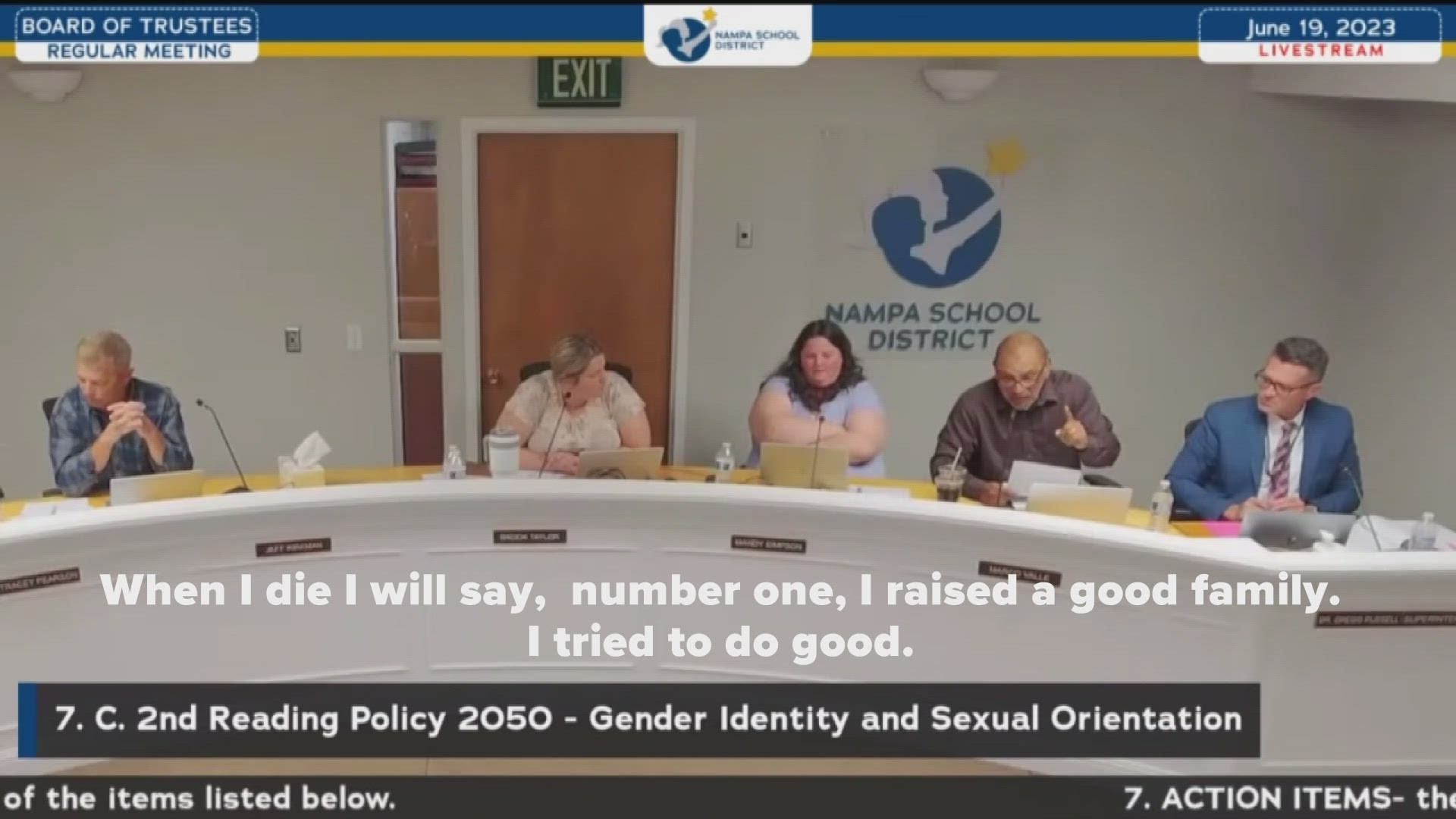NAMPA, Idaho — This article originally appeared in the Idaho Press.
The Nampa School Board passed policy 2050 after reading it a second time on Monday. The policy affects all grade levels and prohibits gender identity, sexual orientation, transgender identity and gender expression to be discussed or taught in Nampa schools.
“If I was to say ‘what is the best thing I’ve ever done in my life’ when I die, I would say number one: I raised a good family and I tried to do good. Number two: I passed this policy,” Marco Valle, Nampa school board member, said.
The Nampa schools’ policy explains that the school board recognizes the “rights of parents, guardians, and caregivers to discuss, address, and educate their child on every subject matter, especially the non-academic subject matters not addressed in the District.” The policy has similarities to the controversial Florida bill known to critics as the “Don’t Say Gay” law. Florida Gov. and Republican presidential nominee hopeful Ron DeSantis’ bill banned classroom instruction about sexual orientation and gender identity in all grades.
Policy 2050 was first brought to the board in May and comes on the heels of a board meeting in April, where Nampa High School student Cassie Hugo made comments at a board meeting about a psychology class that was “controversial,” with some curriculum covering sex and gender. Discussions amongst the board about what students should or should not be taught have loomed over the district ever since.
The intent of the policy is to empower and provide parents and guardians with the opportunity to have discussions that can have a sensitive nature with their child, board member Jeff Kirkman said. The policy is also intended to prevent staff from having those conversations in the presence of students who don’t want to have those discussions.
“There is no place in my world where the school district becomes the parent to that child,” Kirkman said. “They could become the caregiver or the guardian for a certain amount of time, but they do not become the parent.”
Kirkman suggested students be allowed to talk to their teachers about issues of sex and gender in an informal setting.
“What about those students who do not come from a stable family environment, who need the direction,” Kirkman said. “I can’t forget about those students.”
His concern for those students was addressed by Superintendent Gregg Russell, who said students who need support should be referred to a school counselor.
“I’m very much in favor of this policy, and it’s not because I’m a bigot,” Board Chair Brook Taylor said. “My aunts are gay, my brother-in-law is gay.”
School should be a safe place for all students, Taylor said, but not every teacher is an ally.
“It is not for me to decide or dictate how another parent determines or decides to deal with what their child is going through, what their child is not going through, where their child is going to end up later in life,” Taylor said. “We need to provide safe spaces in the event that there is abuse, there is no question about that in my mind.”
If abuse does exist in homes, it needs to have an outlet and kids should be protected, Taylor said.
“When you ask a 5-year-old their pronouns, this has happened, you are challenging that family through their child, and that is the school district challenging that family’s core beliefs because these are core beliefs ... I want to preserve our rights to have all of our individual beliefs, and to me this policy does that.”
The policy passed with a 3-1 vote; only board member Mandy Simpson voted against the policy passing.
“My biggest problem, and the most sleep I’ve lost over this, is this idea that our teachers can’t survey our students,” Simpson said during the board meeting. “...I know from firsthand experience that if kids don’t feel safe in a classroom, they will not even begin to try to learn the reading, the writing, the math.”
A teacher’s knowledge of their students is pivotal to a student’s education, Simpson said. Kids will achieve more in the classroom if they feel loved and cared for by teachers, Simpson said.
“It does silence people,” Simpson said. “We do need a policy that respects parent involvement and parents’ decision-making — I agree. I actually don’t think this does it.”
Throughout the months of the policy deliberation process, both public comments and occasional board member comments have pointed to God or teachings from the Bible.
“Religion should not come into play in any decisions that are made,” Simpson said. “It’s about the morals and health of the pupils, not my morals, not anyone else’s morals, but the morals of the pupils that are in our buildings.”
The intent of the policy — to have parents involved and informed about what their children are learning at school — is a good one, but the policy isn’t as good as it can be, Simpson said.
“I think we need a policy that truly speaks to how we are going to make sure everyone is loved and respected when they walk in the classroom,” Simpson said. “We’re not there.”
This article originally appeared in the Idaho Press, read more on IdahoPress.com.
Join 'The 208' conversation:
- Text us at (208) 321-5614
- E-mail us at the208@ktvb.com
- Join our The 208 Facebook group: https://www.facebook.com/groups/the208KTVB/
- Follow us on Twitter: @the208KTVB or tweet #the208 and #SoIdaho
- Follow us on Instagram: @the208KTVB
- Bookmark our landing page: /the-208
- Still reading this list? We're on YouTube, too:
HERE ARE MORE WAYS TO GET NEWS FROM KTVB:
Download the KTVB News Mobile App
Apple iOS: Click here to download
Google Play: Click here to download
Stream Live for FREE on ROKU: Add the channel from the ROKU store or by searching 'KTVB'.
Steam Live for FREE on FIRE TV: Search ‘KTVB’ and click ‘Get’ to download.

